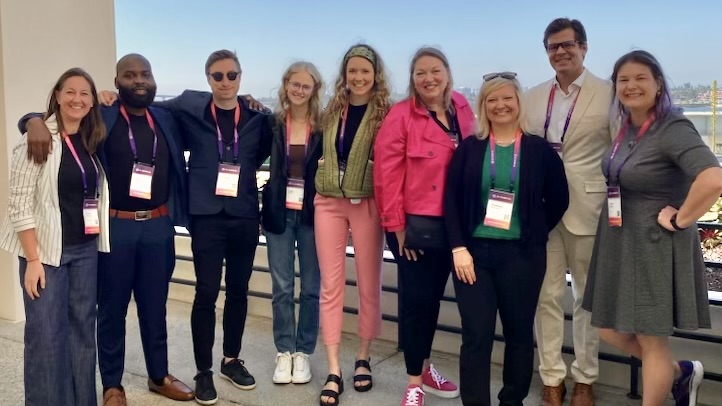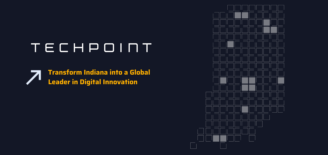Butler EdTech Accelerator cohort energized by learnings at ASU+GSV
Butler EdTech Accelerator cohort energized by learnings at ASU+GSV
By Logan White
In April, the Butler Accelerator for Education and Workforce Innovation cohort and I took part in the Arizona State University – Global Silicon Valley Ventures (ASU+GSV) Summit in San Diego.
The gathering was the 14th year for the conference, which brings together leaders, educators, investors, industry leaders and entrepreneurs who are leading the way in education and workforce innovation. So, it was a perfect environment for the four startups, who are off and running as the inaugural Butler EdTech and Workforce Accelerator cohort:
- Minneapolis-based manager training platform Awesome People Leaders;
- Sweden & New York City-based coding platform for students imagiLabs,
- Bloomington, Ind.-based lesson planning platform Integrate School; and
- San Luis Obispo, Ca.-based student success & engagement platform Trees.app.
We focused primarily on networking with the amazing trendsetters who were gracious in sharing their thoughts and experiences. That networking took many different shapes and forms. For instance, I opted for a sunrise “fun run” at 7 a.m. along the ocean while others decided to sing karaoke until 1a.m.
The sessions were illuminating, as well. Childcare and its effect on the workforce was a major theme, and one we all agreed must be addressed. Consider these startling facts: Fifty percent of women drop out of the workforce after having their first child, and ninety percent of workers with families say they would take a pay cut to work for a company with better benefits for their family.
Chris Bennet, the visionary behind Wonderschool, posed a great question to panelists and the audience that I’m still thinking about: “How can we elevate childcare centers to the status of million-dollar enterprises?”
Bennet previously worked in private equity and embarked on the Wonderschool journey after recognizing the gross undervaluation of the childcare sector. He now works to ensure that every child has access to early education by helping teachers start childcare centers and preschools from their homes. Wonderschool helps with licensing, setting up the classroom, pricing, building a website, operations and matching parents to the program. His most successful childcare provider brings in revenue of about $2 million a year and nets about $800,000.
Sara Mauskopft, CEO and co-founder of Winnie, focused on the cost of childcare, which can rival that of higher education. In today’s workforce environment, which increasingly favors skill-centric hiring practices, she encouraged attendees to consider prioritizing early childhood education over a liberal arts degree.
Another panel discussed the relevance of artificial intelligence (AI) when it comes to childcare. The panel’s consensus was that AI will increase productivity across many industries, but it will likely never expand fully into the childcare industry because of the importance of human involvement in early childhood development. AI will allow teachers and childcare workers to take care of and complete certain tasks, but for the foreseeable future, it will not replace caregivers, they agreed. Because of this, the childcare industry isn’t likely to benefit from cost savings via AI as other industries will.
The second prevailing trend observed across multiple panels is a shift towards prioritizing workforce readiness over traditional college education. This paradigm shift is notably championed by proponents of charter schools. During one panel discussion, the findings of a Stanford study immediately caught my attention: Charter schools are posting performance rates better than public schools with students ahead in math skills by 16 days and reading skills by six days. Speakers also emphasized redirecting focus towards economic mobility rather than adhering strictly to traditional educational pathways.
Indiana’s Secretary of Education Katie Jenner participated on a panel that highlighted Gen Z Career Readiness. She and other leaders in Indiana are actively working to provide students with opportunities like those advocated by supporters of charter schools on other panels. Katie introduced IndianaGPS.com, a groundbreaking platform that consolidates longitudinal data from across Indiana, empowering decision-makers with vital insights. She also unveiled Indiana’s pioneering initiative to revamp high school diplomas, integrating work-based learning opportunities. This innovative proposal grants schools unprecedented flexibility while ensuring students have the chance to explore diverse career paths.
Members of the Butler EdTech cohort were pleased with the access the conference offered.
Imagi Founder Dora Palfi said the gathering allowed her to meet more K-12 leaders and other relevant stakeholders in the education ecosystem in three days than she usually gets to meet in the span of weeks or maybe even months.
“Thanks to events like the IEI ‘superintendents coaching CEOs’ event I had the opportunity to connect with 4 Indiana superintendents in one afternoon,” she said.
Maxwell Witt, who co-founded Integrate School said the conference allowed him to close on a $10,000 investment, as well as catch up with another investor who had earlier declined to support his organization. That investor is giving Integrate School another look now.
“It was a great atmosphere, full of warm leads and great potential,” Witt said. “Just as important, it let us build deeper relationships with our current supporters and educator friends.”
Because of my work with the Butler EdTech Accelerator, I’m surrounded by visionary leaders all the time. Our experience in California has energized each of us, and I’m even more excited to be part of this innovation in Indiana. I can’t wait to see how these organizations are going to make their marks.
The Butler EdTech Accelerator is an intensive 12-week, cohort-based accelerator program, which includes 1:1 coaching, mentorship-driven programming, more than $1 million in deals and perks, and more than 100 connections to mentors and investors. It is supported by gener8tor, Butler University and TechPoint.
Logan White is TechPoint’s Innovation Program Manager, currently focused on the Butler Accelerator for Education and Workforce Innovation.




